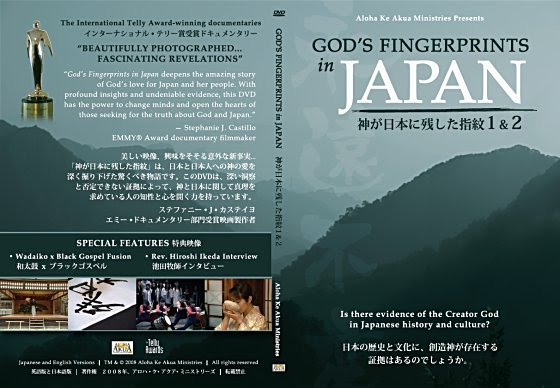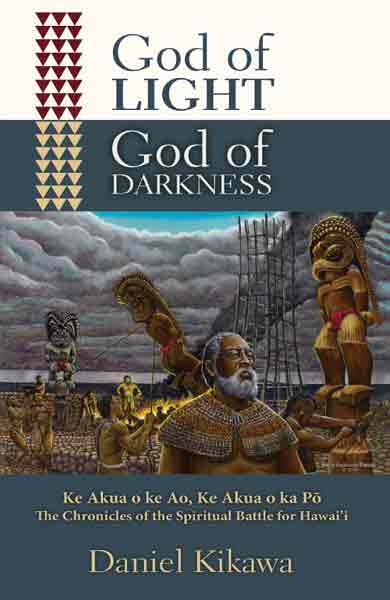God’s Fingerprints In Japan 1 & 2

Overview
God’s Fingerprints in Japan was produced by a team of people from Japan and Hawaii. Although the main production of the video took place in Hawaii, the Japanese team was our guide throughout this project. Without them, this DVD would not have been possible. It has taken seven years and over $100,000 (if waived salaries by the producers are taken into account) to produce this DVD. This project was a labor of love for the Japanese people, we ask them to please accept our humble gift.
About the Producers of God’s Fingerprints in Japan
God’s Fingerprints in Japan was produced by a team of people from Japan and Hawaii. Although the main production of the video took place in Hawaii, the Japanese team was our guide throughout this project. Without them, this DVD would not have been possible. It has taken seven years and over $100,000 (if waived salaries by the producers are taken into account) to produce this DVD. This project was a labor of love for the Japanese people, we ask them to please accept our humble gift.
God’s Fingerprints in Japan has won a 2005 Telly Award in the Religious film category. For endorsements from international leaders for God’s Fingerprints in Japan, go to: www.alohakeakua.org The DVD can be played on computers and DVD players in the United States and Japan. It contains an English version, a Japanese version, an English with Japanese subtitles version and a Japanese with English subtitles version.
This film is culture specific for the Japanese and may seem vague or not “hard hitting” enough to Western minded people. Our Japanese team assures us that the point of this film is very clear to the Japanese without being too foreign (aggressive) in style.
The Executive Producer of the video is Aloha Ke Akua Ministries. Aloha Ke Akua is a non-denominational, non-profit, educational ministry based in Hawaii. Aloha Ke Akua’s board members are from many denominations and are from Asia, Oceania, North and South America, Africa, and the Middle East. For more information about Aloha Ke Akua Ministries and its board, go to the section on ministry information at: www.alohakeakua.org
The Lead Producer is Rev. Daniel Kikawa BS, PhM, president of Aloha Ke Akua Ministries. Daniel is an ordained minister with Grace Bible International. He has been researching the relationship of culture and Christianity for over 20 years and has been a lecturer at Bible colleges and missionary schools around the world. Daniel is the main writer of the script with input and correction from the rest of the team.
Don Mapes is an award winning videographer/director who has worked in secular television for over 30 years. He has worked with over 25 networks from around the world and has directed and edited award winning international marketing videos for clients such as Sony Corporation, IBM, and GTE. Among his many awards, he has won two Telly awards for his video, The Promise, a documentary of the 4th World Christian Gathering on Indigenous People. Don did all of the directing, filming and editing on this video.
Our main translator and Japanese advisor is Rev. Junji Ono, STM. Junji is a Japanese national who lives in Hawaii; however, he travels to Japan about once a month. Junji is very sought after as a translator. Corporations will hire him to fly to New York to translate for one meeting and then fly him to Tokyo to translate for another. Junji also oversees home churches in Hawaii and Japan for Hope Chapel (Foursquare).
Rev. Sakae Sugino is the main source of information for this video. He has been researching the Christian history of Japan for over 30 years. He is a member of the Kyoto Christian History Study Committee and curator of its museum in Kyoto. The Hidden Christian artifacts in the video are from the museum. He is also the pastor of the Rakusai Baptist Church in Kyoto.
Rev. Iichi Hamasaki is the pastor of Otsu Baptist church.
Rev. Isao Iseki is a member of the Kyoto Christian History Study Committee. He is the pastor of Wakayama Baptist church.
Purpose of God’s Fingerprints in Japan
The main purpose of God’s Fingerprints in Japan is to let people of Japanese ancestry everywhere know that God loves them. Christianity has been in Japan for at least 450 years, yet, only 1.6% of the Japanese people claim to be Christian. Among Japanese Americans, only 3% have accepted Christ. Many of those who claim to be Christians feel they have accepted a foreign God and are torn between being Japanese and being a Christian. They see the God of the Bible as a foreign God who prefers Western people and their culture to Japanese people and their culture. In our experience, this is the largest roadblock to the acceptance of the Gospel among Japanese. This video suggests to the Japanese people that the Creator God is not a foreign God but a Japanese God, and that being a believer in Jesus and being Japanese are not contradictory.
“When teaching at missionary schools, I always ask non-Western students what their main objection was to accepting Christ. The main objection, and I am using a mild word because many times it was actually resentment and anger, was that the Christian God was a foreign God who did not love their people. I have found this objection in nearly all non-Western peoples I meet around the world, including most Japanese. Their thoughts are, ‘The Christian God is not our God and he doesn’t love us. If he did love us, we would see his hand of care and involvement in the long history of our people. Instead, he dwelt in the West, only cared for them, and only accepts their culture.”
-Daniel Kikawa
Our Missiological method, therefore, is to suggest to the Japanese people that the God of the Bible is their God, that he has displayed loving care and involvement in their history and culture, and that he loves their culture just as much as Western culture.
In Acts 15:1-29 is recorded a problem that occurred when the first Gentiles (non-Jewish people) became believers in Christ. At this time, there were only Jewish Christians who were still attending the synagogue and following the laws of Moses. They were cultural Jewish Christians and it was not only okay to be culturally Jewish, it was the norm. Some of these Jewish Christians insisted that the non-Jewish believers in Jesus needed to be culturally Jewish too. They wanted the non-Jewish believers to be circumcised and to follow the laws of Moses. The apostles and elders held a meeting about this important issue that threatened to divide the young church. They decided that the non-Jewish believers in Christ did not have to become culturally Jewish to be believers in Jesus but may remain culturally who they were. In other words, they believed that Christianity transcends all cultures and yet encompasses all cultures.
Part One of the DVD – The Japanese Name for the Creator God
Part One of God’s Fingerprints in Japan asks the question, “If there is only one Creator of the entire universe, could the Creator spoken of in the Bible be the same Creator of Japan?”
Does the Bible suggest there would be a name for the Creator in Japanese history and culture?
Romans 1:20 says, “For since the creation of the world God’s invisible qualities – his eternal power and divine nature – have been clearly seen, being understood from what has been made, so that men are without excuse.” (NIV)
Acts 17:26-28 “From one man he made every nation of men, that they should inhabit the whole earth; and he determined the times set for them and the exact places where they should live. God did this so that men would seek him and perhaps reach out for him and find him, though he is not far from each one of us. ‘For in him we live and move and have our being.’ As some of your own poets have said, ‘We are his offspring.’ (NIV)
If these two scriptures are true, then God has made himself clearly seen to all men from the beginning of time. Wherever he placed them around the world, even in the deepest jungles or on an island in the middle of the sea, he was never far from any one of them. He was so close to them that they lived, moved and had their being in him and all men everywhere are rendered without excuse to know him. If this is so, then there should be many things in every people’s history and culture that points to this relationship with God as God reaches out for man and man searches for his Maker. This is known as the “General Revelation” of God to all men as opposed to the “Special Revelation” of God that is recorded in the Bible.
Part Two of the DVD – God Does Not Hate the Japanese or Their Culture
Japanese cultural ideals are full of Godly principles: honor, humility, service, self sacrifice, respect for elders and leaders, loyalty, unity, etc. We should honor these Biblical truths within Japanese culture because they show that God was already working within the hearts of the Japanese people. (Romans 2:14-15).
In Japanese culture, as in all cultures, there are many things that may not be of God and there are many things that could be of God. The things that are from God should be treasured. They are a legacy of God’s love for the Japanese people, tokens of his affection for them. It is not a cultural issue, it is a love issue! The culture is just an outward expression of the beautiful and unique way God created the Japanese people.
Just one of these keepsakes of God’s intimate involvement in Japan is featured in this video, the Tea Ceremony or Chado, the Way of Tea.
Why is It so Important to allow the Japanese Christians to be Japanese?
We are not suggesting that the current Japanese church must change its forms of organization and worship. People should worship and organize in whatever forms they feel comfortable. By the same token, we would want to urge the church to encourage traditional cultural forms among those believers for whom Japanese forms would be the most comfortable.
We find that God is reaching out in this way in many cultures around the world. People who have formerly resisted the Gospel are now responding when they are allowed to “be who they are” as a Christian. One Native American chief related why he did not attend church by saying, “I am an honest man, this (being Native American) is who I am.” He refused to attend church because he could not be who he was there; he had to “act” like a Westerner. He was too honest to be a “fake” person before his Creator. Even Westernized, urban youth have responded to a Gospel presented and practiced in cultural forms. It is very effective for Christ to be transmitted in the language and culture of a people because it is their “heart language.” It is then, no longer a foreign Christianity transplanted from the missionaries’ culture, but “Our” Christianity. Many missiologists who study Japan conclude that there is not yet a “Japanese form of Christianity.”
The Japanese maintain their culture and love their history. Popular samurai and historical dramas are still shown nightly on Japanese television and many are involved in traditional Japanese arts such as the tea ceremony (chado), flower arranging (ikebana), poem writing (haiku), and the martial arts (kendo, karate, judo, jujitsu, etc.).
It is true that the Japanese are very resourceful and most Japanese have adopted many Western and modern ways. However, don’t let this fool you, they are still uniquely Japanese. Japanese businesses may look very Western but if a person goes to Japan and tries to do business American style, he will fail miserably. The business protocols, organizational, decision-making and hierarchical structure are all uniquely Japanese. We, the church in general, have made many of the same mistakes the Western businessmen have.
As all strong and vital cultures do, the Japanese have taken foreign influences and made them uniquely their own. For instance, tempura is known worldwide as a Japanese dish. However, most people don’t know that the Japanese never fried foods until the Portuguese arrived. The Japanese took the Portuguese technique of frying donuts and turned it into the uniquely Japanese tempura! Popular Japanese comic books, movies and cartoons portray samurai heroes with modern hairdos and in a Japanese “techno” style. Japanese “anime” style has even become popular worldwide.
If they desire, can the Japanese sit on the floor as they do in other religious situations, wear kimonos at special events, take part in the tea ceremony, adapt the okoto, bamboo flute, taiko drum and Japanese style dancing to modern worship music and still be good Christians? Does God only love Western style worship, dance, organizational structure, architecture, etc.? Does the Jerusalem Council’s decision in Acts 15:28-29 prohibit Japanese style? If it doesn’t prohibit these things, can Japanese church be Japanese in style? Again, it is not a cultural issue, it is a love issue. It shows that God loves and accepts the Japanese people as they are.
Part Three of the DVD – The Need for Western Christians to Release the Japanese
Although most Japanese Christians are too polite to tell their Western friends, many of them have been dishonored and hurt by Christians unknowingly rejecting who they are as Japanese. It is natural for all people to unconsciously gravitate to what they know, trust and feel comfortable with. It is also natural to feel unsure, want to change or avoid what is strange, unfamiliar or uncomfortable; especially when it comes to “sacred” things. Unconsciously, the church in general has rejected the culture that flows from the Japanese people. Most have done this innocently, not realizing that they had gravitated toward doing church in Western style and not understanding the impact this has had on the Japanese.
It is difficult for the Japanese, who as a cultural norm honor and follow their leaders, to change and use their culture without the blessing and encouragement of their Western denominations. Therefore, we humbly ask Western denominational church leaders and missionaries to please encourage their Japanese brothers and sisters in Christ to appreciate and celebrate the wonderful culture God has given to them.
For more information go to the Culture Specific Evangelism and Culture Based Evangelism section: >click here

